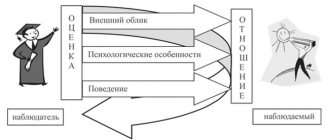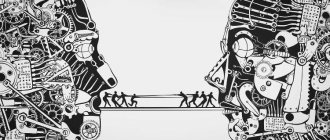In order to understand the meaning of the word “authoritarianism” as accurately as possible, it is easiest to cite a number of synonyms, such as: antidemocratism, totalitarianism, authoritarianism.
Authoritarianism is a style of behavior that is characterized by a strong desire to subordinate, dominate, manage and lead, making absolutely all decisions. An authoritarian person is not inclined to consult, discuss or listen to someone’s opinion; for him there is only his view of reality and his opinion, which he considers the truth.
Authoritarianism as a behavioral style can manifest itself in such areas as leadership, education and communication. However, the characteristics of behavior in all these areas differ little. At work, in the family and in the personal sphere, the authoritarian personality type is manifested in the following factors:
- Increased aggressiveness, rigidity.
- Tendency to coercion, threats, pressure on others (family members or subordinates).
- Strict control, striving for maximum discipline.
- Excessive demands.
- Ignoring the psychological factor, human emotions.
- Focus on results.
- Uncompromising.
This behavior is common, and it has its reasons. The first lies in strict upbringing. A child growing up in a family where authoritarian upbringing reigns is likely to grow into just such a leader. Often an authoritarian leader comes from a person who grew up in a dysfunctional family or was unsuccessful at school, and all his dreams were aimed at achieving success, material well-being, and stability in life.
We recommend: What does agoraphobia mean?
Sometimes an authoritarian leadership style is the result of psychological trauma, loneliness, childhood grievances, or a desire for revenge. Often people choose the authoritarian leadership style consciously, believing that only it leads to real success and achievement of maximum results - in the family, in communication, at work.
Definition
The theory of the authoritarian personality, developed by E. Fromm, says that an authoritarian person is an adherent of a conservative view of the world and a hater of the existing system of government. Leadership weighs heavily on a person, and he considers it his duty to change the ruling elite. This does not mean that the person will run for president and change the structure of the entire country. This means that a person will make small revolutions in his social circle. For example, a person will be able to head a plant where she worked for many years as a manager. An authoritarian person experiences disappointment from life and thinks that this state is familiar to everyone around him. That is why she strives for power, to fill the void with work. The personality believes that the feeling of loneliness arises due to the presence of a large amount of free time, which most people do not know how to manage.
Are there any advantages?
No matter how strange it may sound after everything previously mentioned, authoritarianism has positive sides. But only if it is correctly integrated into your behavior.
It can greatly help people in leadership positions. Having instilled a certain authoritarianism in yourself, it will be easier to cope with large amounts of information, obligations and subordinates.
The person himself will notice that he has become more independent and confident. How to do it? We need to cultivate inner strength within ourselves.
The best technique is training in front of a mirror, which involves pronouncing various mottos, calls and motivating exclamations. It is imperative to take confident poses, form a fixed gaze, and monitor facial expressions and gestures.
You can turn to yourself, exclaiming: “You can do it! You are a confident, strong, authoritative person! You are respected and listened to!” In general, practice self-hypnosis.
Stereotypes
Everyone talks about authoritarian personalities. Not surprisingly, there are many stereotypes about them. Below are the most famous:
- A person who strives for power is unfamiliar with any moral values. Such a person is low in itself, and if she wants to lead, it means she strives to elevate her ego and become a despot.
- Such people are considered to have a limited mind. But if you look at historical examples, it becomes clear that people of an authoritarian character are not only smart, but also perspicacious. And it is not their own frivolity that destroys them, but unsatisfied ambitions.
- Such a person always demands too much from others. This is partly true. But it should be borne in mind that, first of all, a person requires good performance from himself. A person works tirelessly and it is quite logical that a person will demand the same from others.
- Discipline. An authoritative person loves when everything goes according to his plan and no circumstances interfere with the achievement of goals. Discipline helps you achieve your goals faster, as people will focus on the result rather than wasting energy on unimportant actions.
Links
- [https://ourworld.compuserve.com/homepages/hstein/qu-power.htm Quotes from Adler's classic works: Addiction to Power]
- Professor Robert Ahl - online books about congressional corruption, the destruction of traditional conservatism, authoritarianism, the undemocratic agenda of the Religious Right and its immoral authoritarian leaders, the United States stands at a crossroads in the 2008 federal elections.
- John Dean provides authoritarian power. - The first of five American Authoritarians, based on John Dean Without a Conscience.
- Authoritarianism and Polarization in American Politics Mark Hetherington and Jonathan Weiler excerpts
What makes a person authoritarian?
The formation of any person occurs in childhood. It is quite logical that an authoritarian personality is a product of improper upbringing. What can cause a change in consciousness in a child and the acquisition of false values?
Anxiety. A person who is afraid of everything in the world will strive to always and everywhere take control of the situation. Most often, such feelings are generated in a child by mothers who are too protective of their child. The mother does not allow the child to do anything without asking and always intimidates the child. Anxiety is imprinted on the child’s subconscious and therefore he unconsciously strives to take control of any situation.
Lack of independence. This character trait is also the result of overprotection. If parents do not force their child to work from childhood and make all decisions themselves, then the child will grow up too arrogant and complacent. A person will disguise his inability to make decisions as confidence. The person will begin to exploit others to achieve his interests.
The habit of submission. If in childhood the father forced the child to obey his every demand, then growing up, the child can harbor resentment and pour it out on others in adulthood. A person will force those around him to dance to his tune.
Literature
- V. Reich. Psychology of the masses and fascism. St. Petersburg, University Book, 1997.
- E. Fromm. Escape from freedom. M., Progress, 1990.
- Bayazitov R.F. [https://qame.ru/book/common_psychology/authoritarian_stereotype/Bayazitov%20R.F.,%20Authoritarian%20stereotype.pdf Authoritarian stereotype: essence and manifestations in social interactions.] - Nizhnekamsk: Publishing House NMI, 2006. - 175 p.
- Maslow, The authoritarian character structure, The Journal of Social Psychology, SPSSI Bulletin, 1943, No. 18, pp. 401–411.
- Adorno TW, Frenkel-Brunswik E, Levinson DJ, Sanford RN (1950). The Authoritarian Personality. NY
- M. Rokeach, The open and closed mind, N.-Y., 1960.
- H. Eysenck, The psychology of politics, L., 1954; H. Eysenck, Primary social attitudes: A comparison of attitude patterns in England, Germany and Sweden. The Journal of abnormal social psychology, 1953, vol. 48, pp. 563–568
- J. Patterson, G. Wilson, Anonymity, occupation and conservatism. The Journal of Social Psychology, 1969, vol. 78.
- B. Altemeyer, Right-Wing Authoritarianism, Winnipeg, 1981.
Character traits
To make it easier to identify such a person among your friends, you should understand who he is, an authoritarian person. What character traits does the person have, what are her preferences and value system:
- Conservatism. A person does not like something new, and will make his small revolutions based on long-proven methods. Innovation scares people because new technologies seem unreliable and untested. Confidence in technology and methods of action are very important for such a person.
- Servility. Another feature of authoritarianism is the leader’s desire to enslave the consciousness of his subordinates. For his “subjects,” an authoritarian person wants to be almost a god, well, at least an idol.
- Cult of power. A person believes that everything in the world can be achieved through coercion. But this does not mean that he will use his fists to achieve his goals. A person will stop at nothing to make his desires come true.
- Cynicism. A person who is an authoritarian person will treat everyone around him with contempt. And since contempt on the face is not the best mask, the person will mask his true emotions under cynicism and sarcasm.
Key Features
So, what authoritarianism is is clear. It is easy to discern the presence of this quality in a person’s character. This is indicated by the following manifestations:
- The desire to achieve one's goal at all costs.
- The desire to dominate.
- The desire to take the highest position.
- The habit of manipulating others or a pronounced tendency to do so.
- Masterful use of people to achieve personal goals.
- The habit of putting pressure on others.
Authoritarianism is the quality of an individual owner. Anyone who is characterized by this does not listen to outside opinions, does not take them into account when making any decisions, and also rather rudely suppresses any initiatives coming from outside.
And the reason for this behavior is very fanatical: a person sees in these actions self-will and even some kind of encroachment on his authority.
Family
An authoritarian person is a person who received the wrong upbringing. The parents neglected to look after the child and therefore he began to develop various phobias and strange preferences that contradict normal social principles. Which families contribute to the development of an authoritarian personality? A family with one parent, a family in which the father drinks and a family that is overprotective of the child. It is the extremes that create an unhealthy child. A person should grow up in an atmosphere of love and tenderness from childhood. If he doesn't receive enough attention from his parents, he will grow up embittered and hate everyone. If the mother fussed too much over the child, she will be able to raise a selfish creature who will manipulate others without a twinge of conscience. Therefore, it is the parents who are entrusted with the task of properly developing their child. There is no need to blame your mistakes on bad teachers or the bad influence of the street. A good family will never raise an antisocial type.
Theoretical significance
Soon after the publication of The Authoritarian Personality, the theory became the subject of much criticism. Theoretical problems associated with the psychoanalytic interpretation of personality and methodological problems associated with the shortcomings of the F-scale have been criticized. Another criticism was that the Berkeley psychologists' theory implied that authoritarianism only existed on the right side of the political spectrum. As a result, some have argued that the theory is driven by the negative political bias of its authors. The Kremlin found that the anti-authoritarian personality had the same personality characteristics as the authoritarian personality.
Milton Rokeach in 1960 proposed a model of dogmatic personality as opposed to the classical model of authoritarianism. Dogmatism (or closed thinking), as Rokeach believed, is a central construct of the authoritarian personality. Dogmatism, according to Rokeach, is a relatively closed cognitive organization of beliefs and ideas about reality, organized around a central belief in absolute authoritarianism, which in turn forms a rigid structure of intolerance and selective tolerance of others. This personality is not receptive to new ideas, intolerant of ambiguity, and reacts defensively when the situation becomes threatening.
Hans Eysenck in 1954 built a two-factor model that describes personality as a relationship between ideology and cognitive style. The first factor of Eysenck's model, the ideological level, constitutes a continuum from radicalism to conservatism with an intermediate position of liberalism (R-factor). In the second factor, he distinguishes two styles of thinking: hard-attitude and soft-attitude (T-factor). Rigid thinking is characterized by the following characteristics: empiricism (following facts), sensuality, materialism, pessimism, indifference to religion, fatalism, pluralism, skepticism and corresponds to the extroverted orientation of the individual. Soft thinking is distinguished by: rationalism (following principles), intellectuality, idealism, optimism, religiosity, self-will, monism, dogmatism and characterizes introversion. According to Eysenck, rigid ideologies are fascism, which belongs to the conservative pole, and communism, which belongs to the radical pole. The soft-setting ideology is liberalism, which occupies an intermediate position between conservatism and radicalism.
John R. Patterson and Glenn Wilson (English)Russian. in 1973 they proposed a conservatism scale. According to the authors, conservatism is a key factor determining all social attitudes of an individual. The authors closely associate this concept of conservatism with the concepts of “fascism”, “authoritarianism”, “rigidity” and “dogmatism”. The Conservatism Scale (C-Scale) was constructed to measure the following 9 characteristics: religious fundamentalism, orientation to the right wing of the political spectrum, a belief in the need to enforce strict rules and punishments, intolerance of minorities, a tendency to favor generally accepted clothing designs, and affiliation with the mainstream. in art, an anti-hedonic point of view, militarism, belief in the supernatural and rejection of scientific progress.
Robert (Bob) Altemeier (English)Russian in 1981 proposed his concept of right-wing authoritarianism, where he showed that only three of the original nine hypothesized components of the model correlated together: authoritarian humility, authoritarian aggression and conventionalism.
Despite its methodological shortcomings, the Authoritarian Personality theory has had a major influence on research in political, personality, and social psychology. In Germany, authoritarianism has been studied by Clauss Rogmann, Detlef Oesterich and Christel Opfem. One of the most active researchers in this area today is the Dutch psychologist Gee. D. Meloen. One of the most vocal critics of the theory was Australian psychologist John Ray.
A difficult situation
What does an authoritarian person mean? This is a person whose main goal will be the desire for power. A person will passionately desire to dominate everywhere: in the family, at work, among friends. What influences a person’s desire to lead others? The difficult political or economic situation in which a child’s consciousness is formed leaves an imprint on the life of an adult. If the child understood from childhood that leaders were not coping with their tasks, then he began to think that his task was to normalize the situation in the country and achieve a better life for everyone. Despite all his desire to lead, a person always has good intentions. He doesn't want power for power's sake. He wants to benefit the world and help all those who suffer.
Manifestations of authoritarianism bordering on tyranny
They can be identified in the following list:
- Groundless and frequent criticism, concerning literally everything: from appearance to the way you move. At first it may be unobtrusive, but then it becomes so obvious that the victim may develop a feeling of inferiority.
- An attempt to limit external contacts. Such authoritarianism is common in families where the husband is a tyrant. He simply takes control of the victim’s social circle, independently deciding with whom she can communicate and spend time and with whom she cannot. Authoritarian wives, parents, boyfriends and girlfriends can do the same. The purpose of this behavior is to subjugate the victim, to make him dependent.
- Eternal dissatisfaction and the habit of not asking, but demanding. A complete lack of gratitude.
If a person with whom such an “authority” comes into contact tries to express his complaints and indignation regarding such behavior, then he will immediately become guilty and ungrateful.
Education
The authoritarian type of person protests against some rules and standards. He is not against learning, but he is only interested in knowledge and skills that can be useful in the future. Most often, such individuals choose technical rather than humanitarian professions. An authoritarian person tries to improve his vision of the world, but he is limited by the ability to see from only one point of view. He cannot put himself in the position of other people. Therefore, exact sciences are better for people. Such a person receives knowledge with pleasure and never refuses to take any courses. A person continues his studies even after graduating from an educational institution. After all, to be a good and competent specialist in any field, you need to constantly improve yourself.
"Masks of Authoritarianism"
This is the name of the literary work created by the authors Joel Kramer and Diana Olstead. Every person interested in the topic discussed in the article should read it.
The book describes authoritarian ideologies, mechanisms of control and submission in a variety of areas of life, the techniques used, and much more. The topic of religion is also touched upon. The book also helps to understand people’s behavior, to understand why certain people, who seem reasonable, accept any ideology.
The overall message of the book is very valuable. People who read it are ready to parse every page into quotes. Therefore, if you want food for thought, you should pay attention to “Masks of Authoritarianism.”
Profession
Profession, like education, leaves its mark on a person. A person who works in law enforcement agencies is more prone to authoritarianism. But a person who is engaged in philosophical activities, art or other creative activities is unlikely to develop plans to take over the world. Those who, thanks to their profession, have power over others, can use their powers for anything but noble purposes. For example, an officer has much more chances and opportunities to show his authoritarian nature compared to an ordinary soldier. And a person who has served as a subordinate under contract all his life will be servile not only at work, but also in the family. The habit of obeying, just like the habit of commanding, extends throughout a person’s life.
Stupidity and inflated self-esteem
These are the two main reasons for the unreasonable authoritarianism of an individual. Many people, being nothing of themselves, make excessive demands on others. At the same time, they always consider themselves to be right in everything and the smartest. And they live by the principle: “There are only two opinions - mine and the wrong one.”
Of course, such people do not have much success in their work, but this does not bother them. By the way, they can justify this fact by bad luck, bias of their superiors, etc. Such people skillfully seek excuses; everyone around them may be to blame.
But in their personal lives, nothing prevents them from showing authoritarianism. The synonym “despotism” is ideal in this case. If they have loved ones or relatives, then these people will take it out on them in full, acting as a kind of energy vampires. How exactly?
Communication
The authoritarian communication style stands out from the rest:
- The person will talk to you as if you owe him something. He will deliberately belittle your dignity and put moral pressure on you in order to elevate his status. If you do not succumb to such manipulations, the person will move on to active aggression.
- Such a person will always give orders. The person will not ask the other person’s opinion. He himself will decide what his opponent needs and will be confident that he is right even when the interlocutor tries to say the opposite.
- A person will stick to his opinion, even if he understands that it is fundamentally wrong. He is unlikely to be able to admit that he was wrong and accept his defeat.
Literature
in Russian
- Reich V. Psychology of the masses and fascism. - St. Petersburg: University Book, 1997.
- Fromm E. Flight from freedom. - M.: Progress, 1990.
in other languages
- Adorno Th. W., Frenkel-Brunswik E. (English)Russian, Levinson DJ, Sanford RN (English)Russian (1950). The Authoritarian Personality (English)Russian
. Norton: NY. - Altemeyer B. (English)Russian Right-Wing Authoritarianism, Winnipeg, 1981.
- Eysenck H. The psychology of politics, L., 1954;
- Eysenck H. Primary social attitudes: A comparison of attitude patterns in England, Germany and Sweden. // Journal of Abnormal Psychology (English) Russian, 1953, vol. 48, pp. 563-568.
- Maslow A. The authoritarian character structure // The Journal of Social Psychology (English) Russian, SPSSI Bulletin, 1943, No. 18, pp. 401-411.
- Patterson J., Wilson G. (English)Russian Anonymity, occupation and conservatism. // The Journal of Social Psychology (English) Russian, 1969, vol. 78.
- Rokeach M. The open and closed mind, N.-Y., 1960.
Good or bad
Authoritarian behavior can only be condemned when the person has bad intentions. He will strive for his main goal, which will be to improve this world. The followers of an intelligent authoritarian person will be freedom-loving and adequate people. They will not blindly obey their idol. Their obedience will be justified. A leader will help his followers become better people and also show them the path to follow to avoid pitfalls.
But the situation changes when an authoritarian personality with psychological problems comes to power. In this case, the dictator will do what he wants. Such a person will not give anyone an account of his actions. But the individual will demand blind and instant submission from his subordinates.
Resistance to authoritarianism
There is practically none. Because humility has long become a stable archetype of the collective unconscious in our society.
In society, the vast majority of people are accustomed to completely obeying their superiors, and have been for a long time. This is manifested in a variety of sayings and proverbs, including: “Obedience is more important than prayer and fasting,” “I will obey and fall at my feet,” “Whoever has the whip, our hearts and backs belong to him,” etc.
That’s why authoritarian attitudes are still alive. For the same reason, many parents, bosses and teachers consider the approaches described above as the most effective and efficient. Some consider this the only possible way to achieve their goals and fulfill their mission.
Person's reputation
How is an authoritarian personality type perceived by others? People are afraid of tyrants. Subservience and respect are more like fear. An authoritarian personality is quite happy with such a situation. She has no close friends, and therefore a person enjoys the respect emanating from his retinue. In wide circles the person is always known. She has a reputation as a good specialist and a good leader. Nothing bad can be said about a person. But sometimes it’s simply impossible to work with him. The personality tries to remake all subordinates to his standards, which from the outside may seem wild.
Manifestations at work
If a manager considers it necessary to become authoritarian in the eyes of his subordinates, then he can resort to some effective methods. Let's say we introduce penalties. This is a guarantee of unquestioning obedience. Although doubtful.
Because of sanctions, subordinates will develop a fear of punishment. And people don't like being made to be afraid. They, of course, will stop being late and will meet deadlines, but they will still call the boss behind his back not the best words.
Therefore, it is better to motivate them to obey and be responsible in a different way. For example, put a monthly bank in the amount of 30,000 rubles (for example), and say that it will go to the one who makes the most sales. The investment in the bonus will pay off - the offer will interest everyone, and everyone without exception will begin to work more actively. Sales will increase significantly, and the bank will go to one.
The same method will also increase respect for the leader - people like it when their importance is proven financially. Such methods work much better than command intonations and commanding tone.
Test
Are you into socionics? You will like this personality type test. By answering the questions, you can understand how your worldview is similar or divergent from authoritarian people. You need to answer yes or no. Below are some questions from the F-scale test:
- Should children be taught respect and obedience before anything else?
- Can a person without good manners exist normally in polite society?
- Will a person achieve success only when he works hard?
- Are industrialists, managers and salespeople more important than artists and writers?
- Our universe is unknowable, and man will never be able to comprehend all its secrets.
- Is man a toy in the hands of supernatural power?
- Will a liberal person become a conservative with age?
- Are laws not as important to the state as a smart leader who will show people the path to happiness?
Do you believe in socionics? The personality type test should show you how much authoritarianism is developed in your soul. If you answered yes to most of the questions, then this means that at heart you are a born dictator.
Parenting
This topic also deserves a little attention. Parental authoritarianism is a negative phenomenon, which is the subject of many books and scientific works. In such a family, the father and mother treat the child as if they were a subordinate. Here are just a few signs of parental authoritarianism:
- They do not consider it necessary to praise the child for successes and achievements.
- They don’t ask him for anything - they just give orders, orders.
- The child is required to unquestioningly follow any instructions. No attention is paid to his desires and needs.
- Compromises are categorically denied.
- Obedience, respect and adherence to traditions always come first.
- The child is limited in his independence and freedom, often without justifying his decisions.
Authoritarianism makes parents real tyrants. Many fathers and mothers are not just strict - they are cruel, often crossing the line. In most families, this leads to cruel treatment and beating of children.
And parents may argue that this is for the benefit of the child. But in reality, this educational approach is focused only on their needs.









